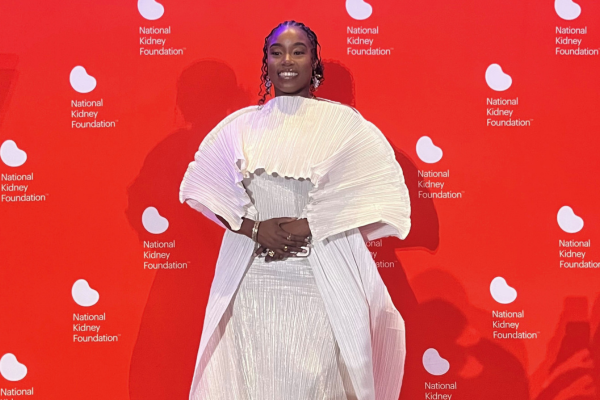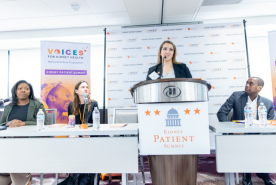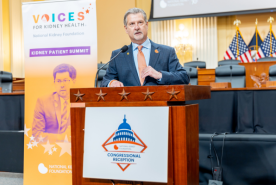July 10, 2025
High blood pressure often goes unnoticed until it's too late, especially in younger people. For Stacey Warr, it led to stage 5 kidney disease. Now, she's using her story to educate and inspire.
Living with Untreated High Blood Pressure
In 2008, Stacey was in college when she began getting severe headaches. Thinking it was a cold, she went to the campus clinic for over-the-counter medicine.
But the clinic found something more serious: high blood pressure. They sent Stacey to the hospital for treatment.
"The staff wouldn't let me leave until my blood pressure went down," Stacey remembered. "When it did, they gave me diuretics (water pills), told me to lay off the salt, and sent me home."
This same scenario repeated itself over the next 11 years. Each time Stacey had headaches from high blood pressure, she got the same advice.
The problem?
Uncontrolled high blood pressure can damage the tiny filters in the kidneys. Over time, it can lead to chronic kidney disease or even kidney failure.
Are you at risk of developing kidney disease? Take our one-minute quiz to find out.
Diagnosed with Stage 5 Kidney Disease
In June 2019, the long-term effects of high blood pressure caught up with Stacey.
"I felt short of breath," she said. "I couldn't walk short distances without struggling, like I'd run a marathon. I couldn't breathe when sleeping on my back."
After three weeks of constant symptoms, Stacey told her mom, who immediately took her to the emergency room.
"My blood pressure was 256/154, which is dangerously high," Stacey said. "I had pneumonia, an enlarged heart, and fluid in my lungs."
She was also diagnosed with stage 5 kidney disease.
"I was devastated. I had no family history of kidney disease. No doctor told me my kidneys could fail from high blood pressure. The diagnosis was a shock to me and my family."
Stacey spent two and a half weeks in the hospital, stunned and scared, but determined.
"I had late-stage kidney disease but didn't need dialysis yet. I felt incredibly lucky," she said. "I decided to do my best to protect what kidney function I had left."
Subscribe today!
Join the NKF Blog Newsletter
Get inspirational stories and kidney disease resources delivered to your inbox every month. You'll gain practical insights and expert advice to help you better understand and manage your kidney health, no matter where you are on your kidney journey.
Maintaining Her Kidney Function
Stacey went home with a kidney-friendly diet, medications, and orders to see her nephrologist every three months.
"I go to my appointments and take my medications like clockwork," she said. "I'm not perfect with my diet, but I work hard to follow it."
Stacey also walks or runs for an hour every day.
"I'll need a transplant someday, so I intentionally stay as healthy as possible," Stacey said.
Her family and friends played a big role in her health journey.
"I have a great support system, the best I could ask for," Stacey said. "They already have a plan in place for when I get a transplant."
Still, Stacey struggled with feelings of guilt and self-blame.
"I did therapy for two years. By the end, I accepted my diagnosis and leaned into courage. I decided to get involved and make a difference for others with kidney disease."
Are you struggling with a diagnosis? Join NKF PEERS to talk with a trained mentor who understands.
Finding Community Through Kidney Advocacy
In 2023, Stacey began looking for a kidney community.
"I went to an NKF event about xenotransplantation using pig kidneys. I thought maybe I'd meet one person. I ended up talking to everyone, including Kevin Longino, NKF's CEO, though I didn't know it at the time!"
That event changed everything. It led to Stacey's first speaking engagement in January 2024 at the 8th Annual Organ Donation Awareness Charity Basketball Tournament, held at Capital One Arena.
"I was so nervous I couldn't feel my legs. But after that, I was hooked. I want to continue sharing my story, helping others, and being a voice for the Black and Brown community."
Since then, Stacey has spoken at NKF's 2025 Kidney Ball, the Black Health Connect Conference, and a local show on NBC4. She also talks with college students and young adults, particularly in underserved communities, about high blood pressure and kidney health.
"If I were better educated about high blood pressure and kidney disease, I would have done more to protect my kidney health," Stacey said. "I want other young people to learn their risks before it's too late."
Helping others did as much for Stacey’s mental health as therapy—maybe even more.
"Now I have a whole support system of friends with kidney disease experience I can talk to anytime," Stacey explained.
Advocating for Change
After years of being dismissed because of her age and symptoms, Stacey now speaks out to make sure others don't fall through the cracks.
Her message to young adults, especially in Black and Brown communities, is clear: ask questions, advocate for yourself, and speak up—early and often.
"I used to think going to the doctor was enough. I've learned how important it is to ask questions, talk to your family, and understand your health," she said. "If a doctor tells you to change your diet, do it, but also ask why."
Stacey also encourages others to use their voices to raise awareness about kidney disease and advocate for improved policies.
"You have no idea how many people you can help just by being honest. People remember stories. That's how change starts."
This is especially true with advocacy work. That's why Stacey shares her story with Congress
representatives.
She hopes to encourage them to support kidney-related bills like:
- The Treat and Reduce Obesity Act (TROA)
- Honor Our Living Donors Act (HOLD)
- Improving Access to Home Dialysis Act
Take Action on NKF's policy priorities.
She also attends NKF's Kidney Patient Summit on Capitol Hill, speaking directly to lawmakers and staff about the challenges people with kidney disease face.
"I want to be the voice I didn't have at 18," Stacey said. "We don't have many visible heroes talking about kidney disease, high blood pressure, and heart disease in our communities," Stacey said. "I want to change that."



















